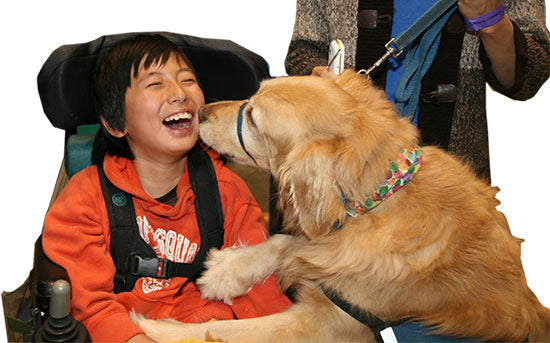Dogs and humans have unique relationship. Amongst other domesticated animals, only dogs are able to perform a wide assortment of roles for the humans such as sniffing out drugs or explosives, herding sheep, and being our beloved loyal companions. It is quite difficult to be precise about when the friendship between the dog and human began, but a reasonable guess is that it has been going strong for more than 20,000 years. In this article, we have listed
Mobility Assistant Dogs help people having physical disabilities like those who use wheelchairs, walkers or crutches. The training process of an assistance dog can take a year or longer. The mobility assistance dogs can be trained to:
- Carry and pick up objects
- Pull wheelchairs
- Open doors
- Retrieve cordless phones
- Perform other daily tasks
2.Diabetes Assist Dogs
Diabetes Assist Dogs help people with the ‘Type I diabetes’. These dogs are trained to sniff for a particular odor in the human breath that is related to the rapidly dropping or low levels of blood sugar. These dogs are trained to “alert” the person suffering from diabetes by contacting them in a special way, such as licking their face, pawing at them, or nudging a hand. The canine companion can also be trained to retrieve juice or a glucose tabs, get help from another person in the house, or get an emergency phone.
3.Dogs for cancer detection
Dogs can also be trained to detect the odor of cancer. Dogs can detect cancer due to fact that the cancerous cells release different metabolic waste products than the healthy cells of human body. The difference of odor is so significant that these dogs can detect the cancerous cells even in the early stages. Dogs can precisely detect various cancers, including bladder cancer, breast cancer, lung cancer, skin cancer and prostate cancer.
4.Autism Assist Dogs
Autism assistance dogs can be the best friend of a child with autism. These are trained assistance dogs with the full public access rights. These dogs are trained to provide safety, peace of mind and a calming influence for the children suffering from autism. These dogs offer a special kind of intervention, and able to improve the lives of children with Autism in ways that no one can predict. A child who refuses to hold the hand of parents in a busy parking lot will eagerly hold a leash of the dog. As the dog follows the parent's commands, the child will follow along willingly. With a command, these dogs can be sent to interrupt the repetitive behavior or to recall a child from a space out.
These service dogs alert a deaf or hard-of-hearing person by making physical contact and then leading the person to the source of the sound. There are various sounds for which these dogs may be trained. Some of these sounds include:
- An oven timer
- Alerting the individual to a door knock or doorbell
- A smoke detector
- The individual’s name being called
- An alarm clock
- A phone ringing
- The sound of an intruder
- A baby crying
6.Seizure Assist Dogs
These dogs help people after and during they have a seizure attack. These dogs stay with the person and lick their face so as to comfort them while they recover from their seizure attack. These dogs can be taught to get help from another person or bring an emergency phone. In addition to this, these dogs can wear a backpack with the pockets that can hold medicine and medical alert information in case the person is unable to communicate.


